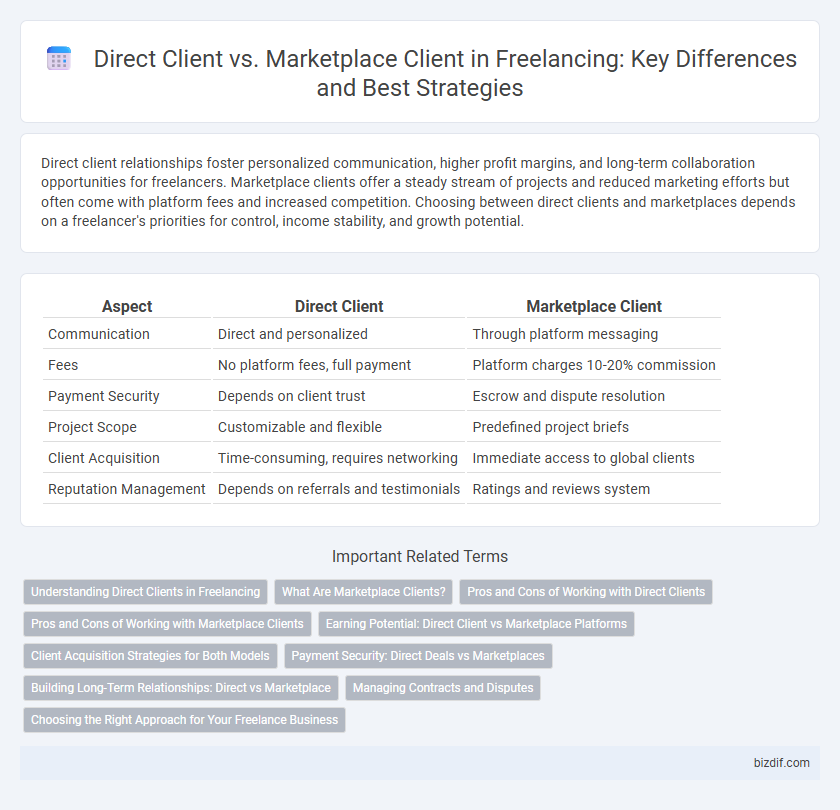Direct client relationships foster personalized communication, higher profit margins, and long-term collaboration opportunities for freelancers. Marketplace clients offer a steady stream of projects and reduced marketing efforts but often come with platform fees and increased competition. Choosing between direct clients and marketplaces depends on a freelancer's priorities for control, income stability, and growth potential.
Table of Comparison
| Aspect | Direct Client | Marketplace Client |
|---|---|---|
| Communication | Direct and personalized | Through platform messaging |
| Fees | No platform fees, full payment | Platform charges 10-20% commission |
| Payment Security | Depends on client trust | Escrow and dispute resolution |
| Project Scope | Customizable and flexible | Predefined project briefs |
| Client Acquisition | Time-consuming, requires networking | Immediate access to global clients |
| Reputation Management | Depends on referrals and testimonials | Ratings and reviews system |
Understanding Direct Clients in Freelancing
Direct clients in freelancing offer streamlined communication and typically higher profit margins compared to marketplace clients, as there are no platform fees or intermediaries involved. Freelancers working with direct clients benefit from clearer project expectations and the ability to build long-term professional relationships that foster repeat business. Understanding client needs and maintaining transparent project scopes are crucial for success in direct client engagements, ensuring mutual satisfaction and timely delivery.
What Are Marketplace Clients?
Marketplace clients are individuals or businesses who seek freelance services through online platforms like Upwork, Fiverr, or Freelancer. These clients post specific project requirements and budgets, enabling freelancers to bid or offer tailored proposals. Marketplace clients often value streamlined communication, project milestones, and platform-mediated payment protection.
Pros and Cons of Working with Direct Clients
Working with direct clients offers higher profit margins as freelancers avoid marketplace fees and gain opportunities to build long-term relationships, leading to consistent project flow and better communication. However, it requires proactive client acquisition and managing all aspects of the project, including contracts, payments, and disputes, which can be time-consuming and challenging for freelancers without a strong sales or negotiation background. Direct clients often expect personalized service and flexibility, demanding a higher level of professionalism and reliability from freelancers.
Pros and Cons of Working with Marketplace Clients
Marketplace clients offer a broad range of projects, providing freelancers with diverse opportunities and a steady workflow guaranteed by platform mediation. However, marketplace clients often come with lower pay rates due to high competition and fees deducted by the platform, reducing overall earnings. Communication can be limited by platform constraints, potentially causing misunderstandings and delays compared to direct client engagements.
Earning Potential: Direct Client vs Marketplace Platforms
Direct clients typically offer higher earning potential as freelancers can set their rates without platform fees, resulting in greater profit margins. Marketplace platforms often charge commission fees ranging from 10% to 20%, which reduces overall earnings for freelancers despite providing easier access to jobs. Freelancers working with direct clients benefit from long-term contracts and repeat business, enhancing income stability compared to the transactional nature of marketplace gigs.
Client Acquisition Strategies for Both Models
Direct client acquisition relies heavily on personal branding, networking, and targeted outreach through platforms like LinkedIn or industry-specific forums to build long-term relationships and secure higher-paying projects. Marketplace client acquisition involves optimizing profile visibility with strong keywords, positive reviews, competitive pricing, and proactive bidding on platforms such as Upwork, Fiverr, or Freelancer to attract a steady flow of gigs. Balancing inbound leads from marketplace exposure with outbound efforts for direct clients enhances overall freelancing success and income stability.
Payment Security: Direct Deals vs Marketplaces
Direct client payments often lack formal escrow services, increasing the risk of delayed or missed payments, whereas marketplaces offer secure escrow systems that protect freelancers by holding funds until project completion. Marketplaces provide a structured payment process with dispute resolution mechanisms, enhancing payment security and reducing fraud compared to direct deals. Freelancers must weigh the higher payment protection of marketplaces against potentially lower fees and flexibility found in direct client transactions.
Building Long-Term Relationships: Direct vs Marketplace
Building long-term relationships with direct clients fosters trust, consistent project flow, and personalized collaboration tailored to specific business needs. Marketplace clients often provide varied short-term projects, which may limit continuous engagement but increase exposure to diverse industries and skills. Prioritizing direct client relationships enhances career stability and higher earning potential through repeat work and referrals.
Managing Contracts and Disputes
Direct clients offer personalized contract terms and streamlined communication, reducing the risk of misunderstandings and disputes. Marketplace clients rely on standardized agreements and platform mediation, which can prolong conflict resolution but provide structured protection for both parties. Effective management of contracts and disputes in freelancing demands clarity in scope, timely communication, and documentation, whether working directly or through marketplaces.
Choosing the Right Approach for Your Freelance Business
Direct clients offer higher profit margins and long-term collaboration opportunities, essential for building a sustainable freelance business. Marketplace clients provide access to a broad audience and consistent project flow, which is ideal for portfolio expansion and skill diversification. Balancing direct client relationships with marketplace exposure maximizes income potential and professional growth in freelancing.
Direct client vs Marketplace client Infographic

 bizdif.com
bizdif.com